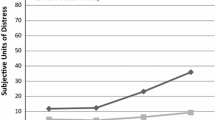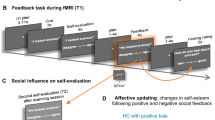Abstract
This study compared the extent to which negative and positive cognitive errors, dysfunctional attitudes, and self-reported symptoms of depression predicted change in college students' depressed mood and social self-esteem following an experimentally arranged negative social event. The amount of negative cognitive errors, the ratio of negative-to-positive cognitive errors, the amount of dysfunctional attitudes, and the amount of depressive symptoms obtained several weeks earlier each separately predicted change in depressed mood following the receipt of bogus negative social feedback. A subsequent 4-step hierarchical regression analysis found that the ratio of negative-to-positive cognitive errors contributed unique variance to the prediction of change in depressed mood after controlling for prior self-reported symptoms of depression and dysfunctional attitudes. Further, only the ratio score significantly predicted change in social self-esteem. Implications for Beck's cognitive model of depression, the limitations of the current study, and suggestions for further research are discussed.
Similar content being viewed by others

REFERENCES
Antonuccio, D.O., Thomas, M., & Danton, W.G. (1997). A cost-effectiveness analysis of cognitive behavior therapy and Fluoxetine (Prozac) in the treatment of depression. Behavior Therapy, 28, 187–210.
Beck, A. T. (1967). Depression: Clinical, experimental, and theoretical aspects. New York: Harper & Row.
Beck, A. T. (1976). Cognitive Therapy and the emotinal disorders. New York: International Universities Press.
Beck, A. T., & Emery, G. (1985). Anxiety disorders and phobias: A cognitive perspective. New York: Basic Books.
Beck, A. T., Rush, A. J., Shaw, B. F., & Emery, G. (1979). Cognitive therapy of depression. New York: Guilford.
Beck, A. T., Steer, R. A., & Garbin, M. G. (1988). Psychometric properties of the Beck Depression Inventory: Twenty-five years of evaluation. Clinical Psychology Review, 8, 77–100.
Beck, A. T., Ward, C. H., Mendelson, M., Mock, J. E., & Erbaugh, J. K. (1961). An inventory for measuring depression. Archives of General Psychiatry, 4, 561–571.
Blackburn, I. M., Jones, S., & Lewin, R. J. P. (1986). Cognitive style in depression. British Journal of Clinical Psychology, 25, 241–251.
Brown, G., Hammen, C. L., Craske, M.G., & Wickens, T. D. (1995). Dimensions of dysfunctional attitudes as vulnerabilities to depressive symptoms. Journal of Abnormal Psychology, 104, 431–435.
Clark, D. A., Beck, A. T., & Alford, B. A. (1999). Scientific foundations of cognitive theory and therapy of depression. New York: Wiley.
Clark, D. A., Beck, A. T., & Brown, G. (1992). Sociotropy, autonomy, and life event perceptions in dysphoric and nondysphoric individuals. Cognitive Therapy and Research, 16, 635–652.
Coyne, J. C. (1994). Self-reported distress: Analog or ersatz depression? Psychological Bulletin, 116, 29–45.
Curran, S. L., Andrykowski, M. A., & Studts, J. L. (1995). Short form of the Profile of Mood States: Psychometric information. Psychological Assessment, 7, 80–83.
Dobson, K. S. (1989). A meta-analysis of the efficacy of cognitive therapy for depression. Journal of Consulting and Clinical Psychology, 57, 414–419.
Dobson, K. S., & Shaw, B. F. (1986). Cognitive assessment with major depressive disorders. Cognitive Therapy and Research, 10, 13–29.
Dohr, K. B., Rush, A. J., & Bernstein, J. H. (1989). Cognitive biases and depression. Journal of Abnormal Psychology, 98, 263–267.
Haaga, D. A. F., Dyck, M. J., & Ernst, D. (1991). Empirical status of cognitive theory of depression. Psychological Bulletin, 110, 215–236.
Hammen, C. L., Ellicot, A., Gitlin, M., & Jamison, K. R. (1989). Sociotropy, autonomy, and vulnerability to specific life events in patients with unipolar depression and bipolar disorders. Journal of Abnormal Psychology, 98, 154–160.
Hammen,C., Marks, T., deMayo, R., & Mayol, A. (1985). Self-schemas and risk for depression:Aprospective study. Journal of Personality and Social Psychology, 49, 1147–1159.
Hammen, C. L., Marks, T., Mayol, A., & deMayo, R. (1985). Depressive self-schema, life stress, and vulnerability to depression. Journal of Abnormal Psychology, 94, 308–319.
Helmreich, R., & Stapp, J. (1974). Short forms of the Texas Social Behavior Inventory (TSBI): An objective measure of self-esteem or social competence. Journal of Social and Applied Social Psychology, 4, 79.
Hollon, S. D., Kendall, P. C., & Lumry, A. (1986). Specificity of depressogenic cognitions in clinical depression. Journal of Abnormal Psychology, 95, 52–59.
Ingram, R. E., Miranda, J. E., & Segal, Z. V. (1998). Cognitive vulnerability to depression. New York: Guilford.
Kendall, P. C., Hollon, S. D., Beck, A. T., Hammen, C. L., & Ingram, R. E. (1987). Issues and recommendations regarding use of the Beck Depression Inventory. Cognitive Therapy and Research, 11, 289–299.
Klocek, J.W., Oliver, J. M., & Ross, M. J. (1997). The role of dysfunctional attitudes, negative life events, and social support in the prediction of depressive dysphoria: A prospective longitudinal study. Social Behavior and Personality, 25, 123–136.
Krantz, S. E., & Hammen, C. (1979). Assessment of cognitive bias in depression. Journal of Abnormal Psychology, 88, 611–619.
Krantz, S. E., & Lui, C. (1987). The effect of mood and information valence on depressive cognition. Cognitive Therapy and Research, 11, 185–196.
Kuiper, N. A., Olinger, L. J., & Martin, R. A. (1988). Dysfunctional attitudes, stress and negative emotions. Cognitive Therapy and Research, 12, 533–547.
Lefebvre, M. F. (1981). Cognitive distortion and cognitive errors in depressed psychiatric and low back pain patients. Journal of Consulting and Clinical Psychology, 49, 517–525.
Leitenberg, H., Yost, L.W., & Carroll-Wilson, M. (1986). Negative cognitive errors in children. Questionnaire development, normative data, and comparisons between children with and without self-reported symptoms of depression, low self-esteem, and evaluation anxiety. Journal of Consulting and Clinical Psychology, 54, 528–536.
Lewinsohn, P. M., Steinmetz, J. L., Larson, P. W., & Franklin, J. (1981). Depression-related cognitions: Antecedent or consequence? Journal of Abnormal Psychology, 90, 213–219.
Lightsey, O. R. (1994). Positive automatic cognitions as moderators of the negative life event-dysphoria relationship. Cognitive Therapy and Research, 18, 353–365.
McKenna, J. J. (1987). Self-enhancing and self-deprecatory cognitive errors in relation to self-reported esteem and depression. Unpublished doctoral dissertation, University of Vermont.
McNair, D. M., Lorr, M., & Droppleman, L. F. (1971). Profile of Mood States manual. San Diego, CA: Educational and Industrial Testing Service.
Messer, S. C., Kempton, T., Van Hasselt, V. B., Null, J. A., & Bukstein, O. G. (1994). Cognitive distortions and adolescent affective disorder. Behavior Modification, 18, 339–351.
Miranda, J., & Persons, J. B. (1988). Dysfunctional attitudes are mood dependent. Journal of Abnormal Psychology, 94, 76–79.
Oliver, J. M., & Baumgart, E. P. (1985). The dysfunctional attitudes scale: Psychometric properties and relation to depression in an unselected adult population. Cognitive Therapy and Research, 9, 161–167.
Persons, J.B., & Miranda, J. (1992). Cognitive theories of vulnerability to depression: Reconciling negative evidence. Cognitive Therapy and Research, 16(4), 485–502.
Robins, C. J., Hayes, A. M., Block, P., Kramer, R. J., & Villena, M. (1995). Interpersonal and achievement concerns and the depressive vulnerability and symptom specificity hypothesis: A prospective study. Cognitive Therapy and Research, 19, 1–20.
Schwartz, R. M. (1986). The internal dialogue: On the asymmetry between positive and negative coping thoughts. Cognitive Therapy and Research, 10, 591–605.
Schwartz, R. M., & Garamoni, G. L. (1989). Cognitive balance and psychopathology: Evaluation of an information processing model of positive and negative states of mind. Clinical Psychology Review, 9, 271–294.
Shacham, S. (1983). A shortened version of the Profile of Mood States. Journal of Personality Assessment, 47, 305–306.
Smith, T.W., Aberger, E.W., Follick, M. J., & Ahern, D. K. (1986). Cognitive distortion and psychological distress in chronic low back pain. Journal of Consulting and Clinical Psychology, 54, 573–575.
Smith, T. W., Follick, M. J., Ahern, D. K., & Adams, A. (1986). Cognitive distortion and disability in chronic low back pain. Cognitive Therapy and Research, 10, 201–210.
Stiles, T. C., & Gotestam, K. G. (1989). The role of automatic negative thoughts in the development of dysphoric mood: An analogue experiment. Cognitive Therapy and Research, 13, 161–170.
Taylor, S. E., & Brown, J. D. (1994). Positive illusions and well-being revisited: Separating fact from fiction. Psychological Bulletin, 116, 21–27.
Vredenburg, K., Flett, G. L., & Krames, L. (1993). Analog versus clinical depression:Aclinical reappraisal. Psychological Bulletin, 113, 327–344.
Watkins, J. T, & Rush, A. J. (1983). Cognitive Response Test. Cognitive Therapy and Research, 7, 425–436.
Weems, C. F., Berman, S. L., Silverman, W. K., & Saavedra, L. M. (2001). Cognitive errors in youth with anxiety disorders: The linkages between negative cognitive errors and anxious symptoms. Cognitive Therapy and Research, 25, 559–575.
Whittal, M., & Dobson, K. S. (1991). An investigation of the temporal relationship between anxiety and depression as a consequence of cognitive vulnerability to interpersonal evaluation. Canadian Journal of Behavioral Science, 23, 391–398.
Author information
Authors and Affiliations
Rights and permissions
About this article
Cite this article
Henriques, G., Leitenberg, H. An Experimental Analysis of the Role of Cognitive Errors in the Development of Depressed Mood Following Negative Social Feedback. Cognitive Therapy and Research 26, 245–260 (2002). https://doi.org/10.1023/A:1014577904837
Issue Date:
DOI: https://doi.org/10.1023/A:1014577904837



